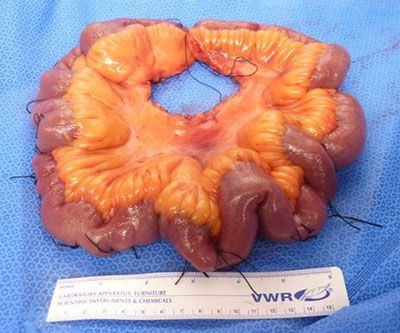Scientists Discover Genetic Link For Rare Intestinal Cancer, Often Found Too Late To Be Treated

Scientists at the National Institute of Health (NIH) have discovered a key genetic link for a rare intestinal cancer known as small intestinal carcinoid. Genes account for up to 35 percent of these cases, the researchers suggest in their report.
The results are significant, because detecting this rare cancer is often difficult and occurs too late. Genes passed down through relatives weren’t previously associated with the cancer until now, so people with a family history of small intestinal carcinoid weren’t typically screened.
“Small intestinal carcinoid tumors usually grow slowly without symptoms,” Dr. Stephen Wank, senior investigator at the NIH’s National Institute of Diabetes and Digestive and Kidney Diseases (NIDDK), an author of the study, said in the press release. “It is often too late to reverse the condition once people seek medical attention.”
The authors state that moving forward, people who have a family history of small intestinal carcinoid should take precautions and get themselves checked out. The researchers identified one particular gene defect that is passed down from one generation to the next that is likely linked to the disease.
They screened 181 people from 33 families — each of whom had at least two cases of the disease. Among the participants, 23 people had the disease that hadn’t been previously detected and hadn’t developed symptoms yet. Because they were screened early (based on their family history), doctors were able to remove tumors in 21 of them.
“This innovative study embodies NIH’s unmatched leadership in rare disease research,” NIDDK Director Dr. Griffin Rodgers said in the press release. “Our new understanding of small intestinal carcinoid tumors gives scientists and health care providers a stronger platform to continue to develop proactive approaches in treatment, diagnosis and prevention.”
If people have a family history of small intestinal carcinoid tumors, they’re invited to join the NIH study by visiting this site. Even though there’s only about 30,000 Americans with the cancer, the researchers hope their results will spur others to get screened sooner versus later.
“Our findings suggest that people with a family history of the disease should be screened for it,” Wank continued. “We hope this research empowers thousands of at-risk people with a way to prevent these tumors from becoming a devastating disease.”
Source: Sei Y, Zhao X, Forbes J, Szymczak S, Li Q, Trivedi A. “A Hereditary Form of Small Intestinal Carcinoid Associated with a Germline Mutation in Inositol Polyphosphate Multikinase.” Gastroenterology, 2015.



























